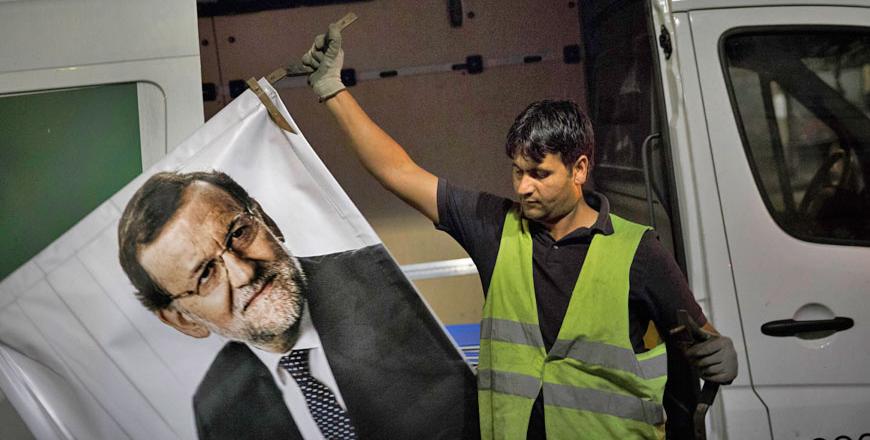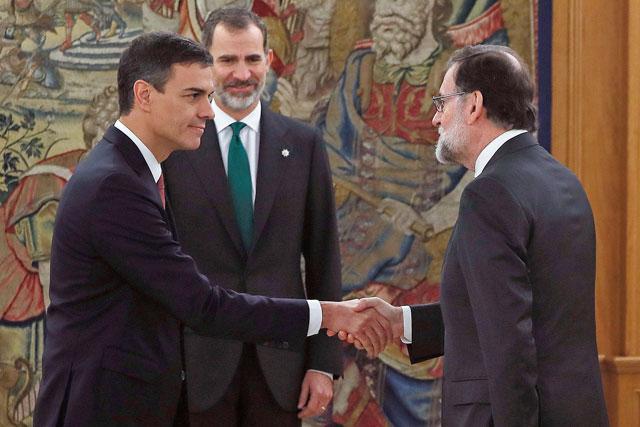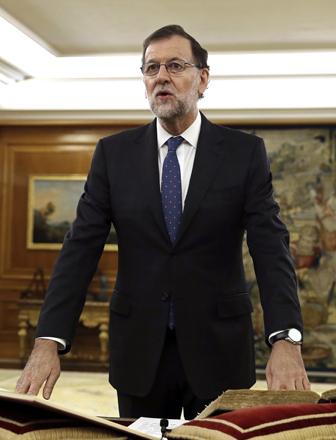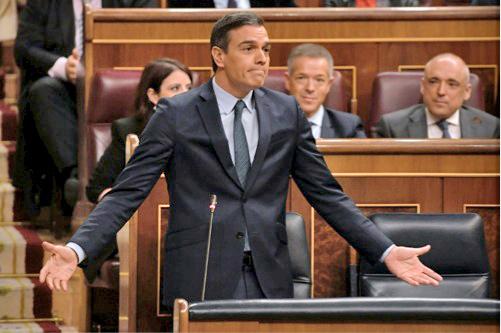You are here
Spain PM battles to stay in power
By AFP - Dec 21,2015 - Last updated at Dec 21,2015

A worker removes a campaign poster for the national elections depicting Spain’s Prime Minister and Popular Party candidate Mariano Rajoy, in Madrid, on Monday (AP photo)
MADRID — Spain's Prime Minister Mariano Rajoy faced an uphill battle to stay in power on Monday after his conservatives lost their majority in an election that saw dynamic new political groupings end decades of two-party rule.
For more than 30 years, Rajoy's Popular Party (PP) and the Socialists had alternated power, but millions of Spaniards exasperated with austerity and corruption scandals voted relative newcomers Podemos and centre-right Ciudadanos into third and fourth place.
While it took the largest share of the vote on Sunday, the PP lost its absolute majority in parliament and Rajoy now has the challenge of forming a stable government — a task that the runners-up were unwilling to make easy.
"On no account will Podemos allow the PP to govern," Pablo Iglesias, the 37-year-old pony-tailed chief of the far-left anti-austerity party told reporters.
The Socialists (PSOE) followed suit, with number two Cesar Luena saying his party would block any government led by Rajoy, whose drastic spending cuts, tax rises and health reforms over the past four years have proved deeply unpopular.
"As far as I know, the PP is going to put forward Rajoy, and so the PSOE will vote no to the PP and Rajoy," he said.
And with the upstart Ciudadanos also ruling out backing Rajoy, the austere 60-year-old premier appears increasingly beleaguered and alienated.
The outcome of the most-closely fought election in Spain's modern history has plunged the country into turmoil as it was just starting to recover from a devastating financial crisis.
And the prospect of weeks of political uncertainty saw the Spanish stock market slump 2.5 per cent in afternoon trade.
European Commission chief Jean-Claude Juncker said he hoped political leaders would succeed in forming a stable government in the eurozone's fourth largest economy.
Official results showed the PP won 123 seats — 63 less than in 2011 when it roared to victory with an absolute majority — with almost 29 per cent of the votes.
The PSOE followed with 90 seats and 22 per cent of the vote, then Podemos with 69 seats and almost 21 per cent, and finally the centrists Ciudadanos with 40 seats or nearly 14 per cent.
The results mean parliament will be made up of four main groupings with significant clout, as opposed to the usual PP and Socialists tandem — putting an end to Spain's traditional two-party system.
In an early bid to soothe concerns, Rajoy had said he would do all he could to form a government, standing on a podium in Madrid marked "Gracias" ("Thank you") and speaking down to cheering supporters.
"Spain needs a government that has the support of parliament," he said.
Scarred by
financial crisis
The outcome caps a year of electoral change in southern Europe after Syriza swept to power in Greece in January and a coalition of leftist parties in Portugal pooled their votes in parliament to unseat the conservative government after an inconclusive election in October.
Sky-high unemployment, inequality, corruption and an ever-rising separatist drive in the northeastern region of Catalonia were just some of the issues at stake in a country deeply scarred by the financial crisis and fed up with what many considered a staid political scene.
"This result will likely usher in weeks of political uncertainty, as the various parties try to hammer out a working arrangement in a country that has a limited history of multi-party government," said Eurasia Group analyst Federico Santi.
After holding talks with the leaders of each party that has won seats in parliament, King Felipe VI, the head of state, will nominate a prime minister — most likely Rajoy.
The nominated leader must then win a vote of confidence in parliament in order to take office.
Ciudadanos has said it will abstain in the vote, and while the PSOE has rejected Rajoy, it could agree not to vote against a conservative government that excludes the incumbent premier, said Fernando Vallespin, politics professor at Madrid's Autonomous University.
If there is still a deadlock within two months of the first vote, the king must call new elections.
Rajoy had positioned himself as a safe pair of hands who dragged the country away from economic collapse when he took power in 2011 and put it on the path of recovery.
But unemployment remains stubbornly high at more than 21 per cent, and millions of Spaniards became fed up with austerity-sparked inequality as well as repeated corruption scandals — one of the contributing factors of the meteoric rise of Podemos.
Created less than two years ago, the anti-establishment party quickly went on to win five seats in European elections, and has now become the parliament's third political force.
Related Articles
MADRID — Socialist Pedro Sanchez took over as Spain's prime minister on Friday, after outgoing leader Mariano Rajoy lost a parliamentary con
MADRID — Mariano Rajoy was sworn in for a second term as Spain's prime minister on Monday, but his minority administration may struggle to g
MADRID — Spain's parliament rejected Socialist leader Pedro Sanchez's bid to be reappointed prime minister on Sunday but he appeared on trac


















